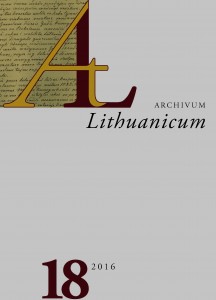BAJORŲ ŽEMVALDŽIŲ EKONOMINĖS IR SOCIALINĖS MINTIES TRAJEKTORIJOS: RAŠYTINIS ANTANO MEDEKŠOS PALIKIMAS
THE ECONOMIC AND SOCIAL TRAJECTORIES OF LANDED NOBILITY: THE WRITTEN LEGACY OF ANTANAS MEDEKŠA (1844 – 1912)
Author(s): Tamara BairašauskaitėSubject(s): Agriculture, Economic history, Social history, 19th Century
Published by: Lietuvių Kalbos Institutas
Summary/Abstract: Antanas Medekša (1844–1912), a large estate owner and a participant in the 1863–1864 insurrection against Russia, is a distinct riddle to historians. His young days were marked by the insurrection of 1863–1864, while his maturity coincided with the political stagnation in which society was submerged during the seventh to ninth decades of the nineteenth century. Medekša was influenced by the spreading ideology of positivism and by the political, social, and cultural resurgence. He wrote and published works on the insurrection and dealt with both economic and social issues in his writings. He remained, however, little noticed by the culturally active people of science and culture in the beginning of the twentieth century. This may have happened due to Medekša’s indifference to the political and national issues that were passionately discussed at the time. Medekša had his own vision of the society’s future; he associated it with economic thinking and the source of his inspiration was political economy. In this sense, Medekša was a cosmopolitan searching for the best examples for Lithuania and Belarus in Western Europe. The object of his care was primarily the agricultural strata of society, and the main branch of the economy was agriculture. So far, historians have written about Medekša only in the context of the insurrection, and his biographies include only the period of emigration (1863–1874/1875). His Lithuanian period (1875–1912), however, has not been researched at all, and attempts to find new and to check old biographic facts have been unsuccessful. Even those better-researched ties of Medekša’s writings to the insurrection raise many unanswered questions. It is certain that he was an author of the work Monograph of Insurrection Squads in Lithuanian Lowlands (Monografia oddziałów powstańczych na Żmudzi; 1864), even though there have been attempts to reconsider his authorship.
Journal: Archivum Lithuanicum
- Issue Year: 2016
- Issue No: 18
- Page Range: 303-336
- Page Count: 34
- Language: Lithuanian

